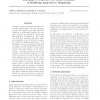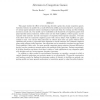53 search results - page 7 / 11 » A Polynomial-time Nash Equilibrium Algorithm for Repeated St... |
BIRTHDAY
2009
Springer
14 years 2 months ago
2009
Springer
We introduce a new class of games, asynchronous congestion games (ACGs). In an ACG, each player has a task that can be carried out by any element of a set of resources, and each r...
ICML
2005
IEEE
14 years 8 months ago
2005
IEEE
Learning algorithms often obtain relatively low average payoffs in repeated general-sum games between other learning agents due to a focus on myopic best-response and one-shot Nas...
ICML
2003
IEEE
14 years 8 months ago
2003
IEEE
Learning in many multi-agent settings is inherently repeated play. This calls into question the naive application of single play Nash equilibria in multi-agent learning and sugges...
CORR
2008
Springer
13 years 7 months ago
2008
Springer
This paper studies the effects of introducing altruistic agents into atomic congestion games. Altruistic behavior is modeled by a trade-off between selfish and social objectives. ...
ESA
2009
Springer
14 years 2 months ago
2009
Springer
We consider a process called Group Network Formation Game, which represents the scenario when strategic agents are building a network together. In our game, agents can have extrem...


